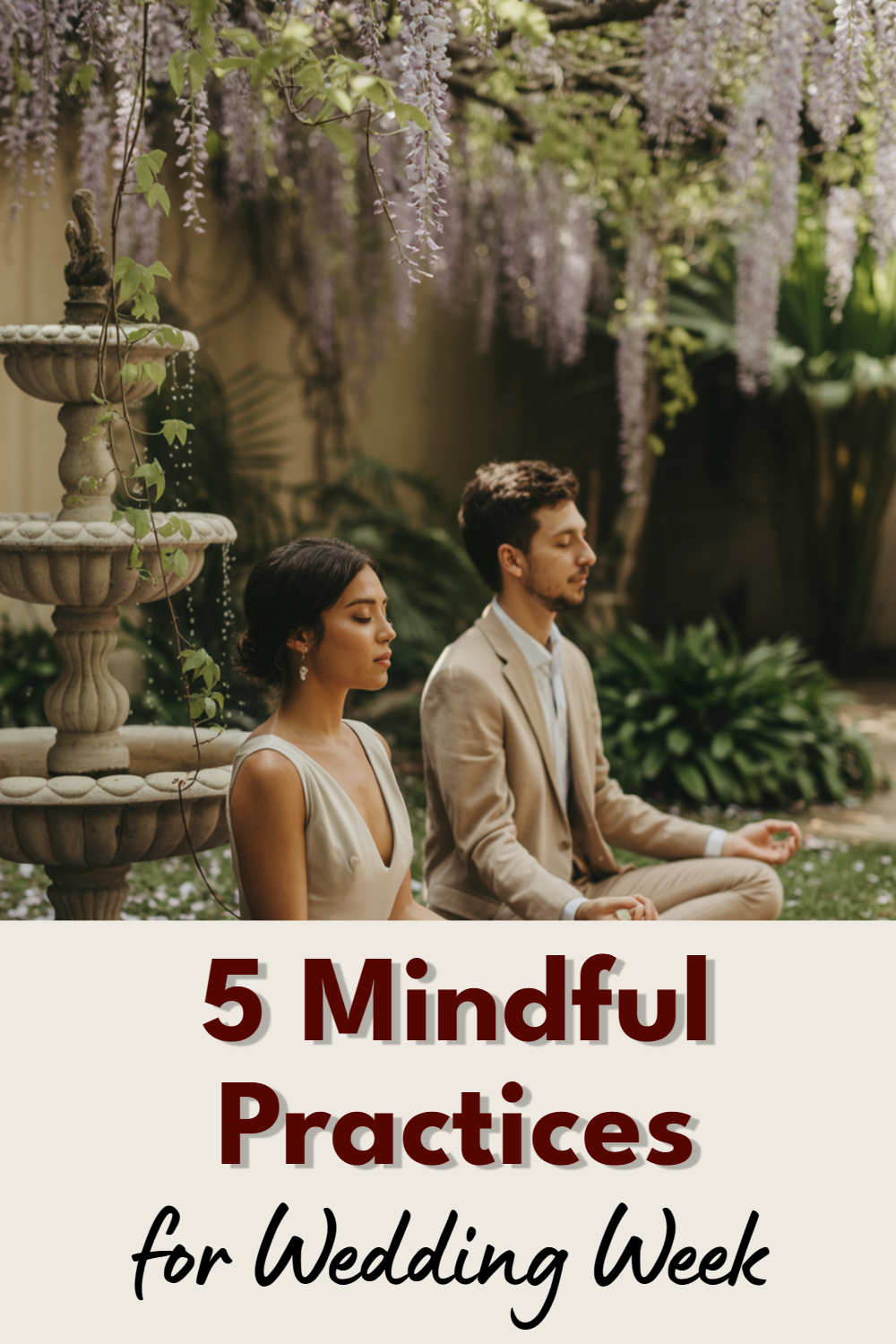Wedding week arrives like a freight train—suddenly, inevitably, and with enough momentum to knock you sideways if you’re not prepared.
After helping countless couples navigate this intense stretch, I’ve learned that the difference between surviving and thriving comes down to how intentionally you move through these final days.
Here are five practices that will keep you grounded when everything else feels like it’s spinning.
1. Create Sacred Morning Moments
Your wedding week mornings set the tone for everything that follows. Instead of immediately reaching for your phone to check vendor messages or scrolling through last-minute details, claim the first twenty minutes of each day as yours alone.
This doesn’t mean you need to become a meditation guru overnight. Simple rituals work best: brewing coffee slowly while watching the sunrise, writing three things you’re grateful for, or doing gentle stretches in bed before your feet hit the floor.
The key is consistency—whatever you choose, do it every morning of wedding week.
I’ve watched brides transform their entire week by protecting this small pocket of peace.
One client told me her morning ritual of reading poetry became the anchor that kept her centered through a rehearsal dinner crisis and unexpected rain on her wedding day. When chaos swirled around her, she had this calm foundation to return to.
2. Practice the Art of Selective Attention
Wedding week brings an avalanche of inputs: vendor calls, family questions, last-minute RSVPs, weather updates, and a thousand tiny decisions that suddenly feel monumentally important.
Learning what deserves your attention—and what doesn’t—becomes a survival skill.
Create three categories: “Must Handle Personally,” “Can Delegate,” and “Not My Problem.”
Be ruthless about sorting everything into these buckets. The florist running late? Must handle. Aunt Martha’s opinion about your processional music? Not your problem. Your maid of honor can field those calls.
I’ve seen couples exhaust themselves trying to manage every detail personally, then arrive at their altar feeling depleted rather than joyful.
Your wedding planner, family members, and wedding party are there to handle the logistics so you can focus on the meaning.
3. Embrace Micro-Meditations Throughout the Day
Forget the idea that mindfulness requires sitting cross-legged for thirty minutes. Wedding week calls for stealth meditation—tiny moments of intentional breathing scattered throughout your busy days.
Try this: every time you wash your hands, take three deep breaths and notice the water temperature. When you’re waiting in line or stuck in traffic, use those moments to scan your body for tension and consciously relax your shoulders.
Before entering any wedding-related meeting or call, take five seconds to set an intention for how you want to show up.
These micro-practices add up to something powerful. One groom I worked with used the elevator rides in his hotel as breathing breaks, transforming what could have been anxious moments into opportunities to reset.
By his wedding day, this had become such a natural habit that he automatically found his calm center during the ceremony.
4. Schedule Non-Negotiable Connection Time
Amidst all the wedding preparation, it’s easy to forget why you’re doing this in the first place. Carve out protected time with your partner that has nothing to do with wedding logistics—no vendor discussions, no timeline reviews, no family drama processing.
This might look like a twenty-minute walk together each evening, sharing a meal without phones, or simply lying in bed talking about your future beyond the wedding day. The specific activity matters less than the intentionality behind it.
Some of my most grounded couples have made this their non-negotiable ritual. They refuse to discuss wedding details during these connection windows, instead focusing on what they love about each other and their excitement about marriage itself.
These moments become precious islands of intimacy in a sea of logistics.
Even when family members protest or vendors need immediate answers, protecting this time pays dividends. You’ll make better decisions from a connected place, and you’ll actually remember why you’re celebrating in the first place.
5. Implement the Evening Wind-Down Ritual
How you end each day of wedding week determines how well you sleep and how you’ll feel the next morning. Create a consistent routine that signals to your nervous system it’s time to shift from planning mode to rest mode.
Start by setting a hard cutoff time for wedding-related activities—I recommend at least two hours before you want to fall asleep.
After that cutoff, no more vendor emails, no more timeline adjustments, no more problem-solving. What doesn’t get handled tonight will still be there tomorrow.
Fill those final hours with genuinely restorative activities. Take a warm bath with Epsom salts, read fiction, listen to calming music, or practice gentle yoga. Avoid screens when possible, but if you must use them, switch to night mode and keep the content light.
I’ve had couples tell me their wind-down ritual became so sacred during wedding week that they continued it long into their marriage.
One bride started journaling each night about what she was looking forward to, and this practice helped her stay connected to joy rather than getting lost in anxiety about details going wrong.
The goal isn’t perfect relaxation—wedding week naturally comes with some excitement and nervous energy. Instead, you’re creating a container that allows your system to downshift gradually rather than staying in high alert mode until you collapse.
Moving Through Your Week with Intention
Wedding week will test your ability to stay present, but these practices aren’t about achieving some zen-like state of perpetual calm. They’re about creating touchstones that bring you back to yourself when the inevitable stress spirals begin.
Some days you’ll nail every practice; other days you’ll barely manage one. Both are perfectly normal. The power lies not in perfect execution but in having tools that help you return to center when you need them most.
Your wedding day will be more joyful when you arrive having practiced presence all week long.


